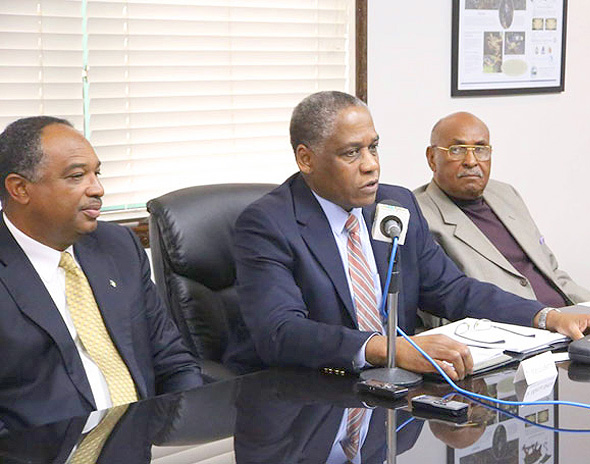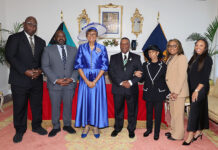
On February 2016, the Hawksbill Creek Agreement Review Committee held a press conference with the intent to inform and educate licensees and civil society on the Hawksbill Creek Agreement (HCA) in general and specifically those provisions relevant to the work of the HCARC and to open dialogue on the recommendations of the HCARC made to the Government of Bahamas (GOB) on the governance structure of Freeport and the economic revitalization of Freeport and Grand Bahama Island.
HCARC “Terms of Reference”: March 5th 2015 the HCARC was appointed by PM Christie with the following objectives derived from the “Terms of Reference.”
1. “Agree with the GBPA and principal licensees a long term economic development plan which both protect and promote the shipping , industrial, logistics, tourism, real estate and other commercial sectors as the focus foe Grand Bahama Island.
2. Create a frame work for the immediate and long term investment promotion on the island to attract investors which can operate assets competitively at a world class standard, and effectively and efficiently utilize the land resources with proper environmental safeguards.
3. Ensure that the mechanisms are in place to align the Grand Bahama Port Authority’s quasi- regulatory authority with the policies of the Government and that a regulatory framework exists in keeping with present and changing international business best practices.
4. Agree a suitable framework for property tax and business license that would not impede economic growth, and contribute along with other suitable measures to the enhancement of the Government’s revenue base.”
These objectives were addressed in the Committees report presented to PM Christie in June 2015 and recently communicated by the PM to the House of Assembly on 3rd February 2016.
The Committees work included interviews with the St. George and Hayward families who are the owners of the GBPA, Port licensees, many Professional organizations, GB Chamber of Commerce, GB Christian Council and other members of Civil Society. In addition four town meetings were conducted throughout GBI.
Verbal and written Input and advice from these persons and institutions informed the HCARC and provided the basis for its recommendations to GOB.
HCARC Recommendations derived from PM Christie Communication to Parliament 3rd February 2016:
“The Hawksbill Creek Agreement Review Committee’s extensive and far reaching recommendations to the Government include extension of the expiring tax concessions for a period of 20 years in exchange for the following with a mechanism to monitor performance through periodic review every five (5) years, with a view to ensuring the best economic outcome for all parties:
1. Within one (1) year of extension, secure an international investor with the capacity to purchase majority ownership of GBPA to enable it to properly meet its obligations and development commitments;
2. Submission by the Grand Bahama Development Company Ltd of a specific master development plan within six months of the extension, focused on the key sector opportunities above and including detailed development plans and concrete evidence of financing;
3. Change to the governance structure to allow for the Government to participate in GBPA and PGL through Directors/members appointed to the Board with a clear role and responsibility around development. Further, licensees to be able to elect a Director to the GBPA Board;
4. An equity interest for the Government in GBPA and PGL companies in consideration for the value of the concession extensions, the value of any unmet obligations under prior extensions, as well as any obligations of the GBPA not met under the HCA (e.g. any deficit in the Port Area, any unmet maintenance and operations responsibilities), following an independent audit by an accounting firm to be mutually agreed;
5. GBPA / PGL must establish and capitalize an independent investment promotion agency (IPA), with expertise in retaining, expanding and attracting businesses;
6. To introduce a process which gives the right of appeal for GBPA’s licensing decisions;
7. Reaching mutually agreeable terms relating to the exclusive rights of Freeport Harbour Company to container ports, cruise ports, etc. on Grand Bahama, which would allow for exclusive right on container ports for a fixed period, and the development and operation of cruise ports within and outside the port area by other parties;
8. Agreement to modernize the Grand Bahama International Airport and pursue options to lower cost of airlift (e.g., under a public/private partnership arrangement);
9. Specific commitments around quality of life investments (e.g., hospital, sports center upgrades, bridge/road upgrades, etc.);
10. Transparency by providing to the public information on revenue and expenses for municipal services;
11. Work in collaboration with the Bahamas Government and the Grand Bahama Port Authority to secure suitable partners and arrangements which would secure the economic viability of Hutchison’s hotels, casino and tourism assets, and curtail unsustainable losses and large Government subsidies.
12. The possible introduction of real property tax on undeveloped land as a stimulus for development and the provision of the necessary revenue, to meet the rising cost of government services and infrastructure costs in Freeport, or some alternative form of contribution from the GBPA and its licensees to meet such costs.
In parallel to recommending changes to the current ownership and governance on the island, the Committee also recommends that certain other changes be made to increase the competitiveness of Grand Bahama as a location for global investment. Those changes are as follows:
1. Create a one-stop-shop to manage all GBPA and governmental approvals, with specific guidelines, and, where matters need to be referred to the Central Government, a period of no more than twenty-one (21) days be fixed for approval/determination (as the case may be);
2. Move certain regulation currently overseen by GBPA to independent public bodies (e.g., energy regulation to a public regulator, environment to the Ministry responsible, airport fees and charges to the Ministries/Agencies responsible.);
3. Create transparency and fiscal stability for Grand Bahama Island by conducting one-time and on-going audits of Government deficit on GBI, performed by a mutually agreed public accounting firm. Moving forward, the Government should present such accounting to GBPA annually to determine whether a deficit exists;
4. Improve efficiency of dealing with labour and immigration matters. The Ministries responsible for immigration and labour should establish a system to efficiently deal with work permits on an expedited basis, (within 21 days), and, where earlier approvals are needed, within 48 hours, recognizing that there may exist a need for specialist skills which are not readily available in The Bahamas;
5. Improve skills training and recruitment. Establish an ongoing multifaceted training programme suited to the skills needed in Grand Bahama, involving Ministries responsible for Education, Training and Labour, the College of the Bahamas, the National Training Agency, principal licensees, the GB Chamber of Commerce, and the GBPA;
6. Improve data collection on Gross Domestic Product (GDP) such that progress is able to be tracked;
7. Improve communications between Government and GBPA, licensees and public prior to any major policy changes;
8. To the extent that it has not done so, GBPA and Dev Co. to ensure that land transactions (historical and looking forward) are duly recorded at the Registrar General’s Department.”
HCARC website: www.hcareview.org









